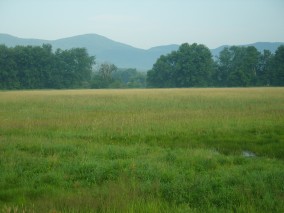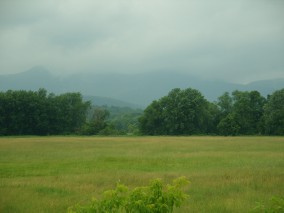Human actions have local and global impacts
- Article Published At:
- Rutland Herald
- Date of Publication:
- July 18th, 2010
For the third year in a row the month of June was rather wet. Flowers, vegetables and weeds flourished. The peas I planted back in mid-March, during that exceptionally early spring warmth, produced a good crop. I pulled them up before the end of June and planted kale and more beets into the moist soil.(See Figure .)
Ample water also kept early summer temperatures lower than usual, partly because more evaporation takes up more of the sun’s energy. Also, more evaporation means more clouds, which reflect sunlight before it even reaches the ground. Winter temperatures have been rising quite sharply in New England in recent decades — but as long as we get plenty of summer rain, the warm-season temperature rise is reduced.
In early July the weather pattern shifted, bringing a ridge of high pressure over us for a week.(See Figure .) This brought subsiding dry air that gave us clear skies with 90-degree temperatures. Evaporation continued, but without rain the soil dried down and lost an inch of water every week to evaporation. This is about the amount of available water stored in the first 6 inches of soil — so many garden crops with only shallow roots need water after a week or so with no rain. Forests, on the other hand, have deeper roots, which simply draw water from deeper levels in the ground. This is one of the important ways that forests buffer our climate: They can evaporate water for weeks without rain. Fortunately the high pressure of early July moved away, and surface evaporation again produced clouds and thunderstorms.
On the global front, several recent reports in the journal Science paint a disturbing picture of humanity’s impact on the oceans. As atmospheric greenhouse gases rise, the oceans are storing the trapped heat and getting warmer — especially in the Arctic, where the ice cap, which reflects sunlight, is melting and shrinking. The rise in sea levels will be a wake-up call for our coastal cities.
Humanity’s demands for resources also keep growing, while our waste products and our thoughtlessness could transform the ocean web of life. Overfishing has reduced many wild stocks. The oceans are filling with our long-lived plastic debris. Consider the irony that our precious plastic water bottles may end up as fragments in the ocean. And this summer the Gulf of Mexico is being poisoned by crude oil from our reckless drilling practices. Above all, the acidity of the oceans is increasing as billions of tons of CO2 (from the burning of fossil fuels) are dissolving in all the Earth’s seas. With increasing acidity, many creatures will be unable to extract calcium from seawater to make their shells or corals within a few decades. In one century, we will roll the acidity of the oceans back twenty million years — a foolish experiment with unknown consequences.
Has the United States, one of the great polluters of the Earth, woken up to its responsibilities? Some citizens have, but our nation seems to be either dreaming or in paralysis. We hear daily about the need to return to a wasteful, fossil fuel-powered, consumer “growth” economy. But really we need to build a resilient sustainable society, powered by renewable energy — a society designed to produce no waste, a society that understands and treasures its place in the Earth’s ecosystem, a society that cares for its citizens and all life on this planet.
This may seems like a dream from where we are today, but it is really a choice about changing our direction and our values. It is a personal matter, a societal issue and a global problem. We can only start from where we are. We must talk to our neighbors and colleagues and bravely take the first step. The Earth changes slowly — but it is more powerful and in many ways smarter than we are. It is up to us to understand and adapt to the real world.
Related Topics
Figures and Images
 Figure 1: Hazy dry July weatherHot dry July day in Pittsford
Figure 1: Hazy dry July weatherHot dry July day in Pittsford Figure 2: Wet June weatherRainy June day in Pittsford
Figure 2: Wet June weatherRainy June day in Pittsford